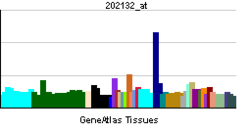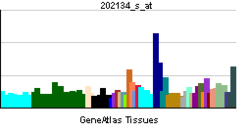WWTR1
| View/Edit Human | View/Edit Mouse |
WW domain-containing transcription regulator protein 1 is a protein that in humans is encoded by the WWTR1 gene.[4][5][6]
Function
WWTR1 It is a transcriptional coactivator which acts as a downstream regulatory target in the Hippo signaling pathway that plays a pivotal role in organ size control and tumor suppression by restricting proliferation and promoting apoptosis. The core of this pathway is composed of a kinase cascade wherein MST1/MST2, in complex with its regulatory protein SAV1, phosphorylates and activates LATS1/LATS2 in complex with its regulatory protein MOB1, which in turn phosphorylates and inactivates YAP1 oncoprotein and WWTR1/TAZ. WWTR1 enhances PAX8 and NKX2-1/TTF1-dependent gene activation. Regulates the nuclear accumulation of SMADs and has a key role in coupling them to the transcriptional machinery such as the mediator complex.
Using the human SHSY5Y cell line as a model of neuronal differentiation, human FAT1 was shown to regulate the nucleocytoplasmic relocation of WWTR1/TAZ and enhanced transcription of the Hippo target gene CTGF. The same study also showed FAT1 was able to regulate TGF-beta signalling [7]
References
- ↑ "Diseases that are genetically associated with WWTR1 view/edit references on wikidata".
- ↑ "Human PubMed Reference:".
- ↑ "Mouse PubMed Reference:".
- ↑ Kanai F, Marignani PA, Sarbassova D, Yagi R, Hall RA, Donowitz M, Hisaminato A, Fujiwara T, Ito Y, Cantley LC, Yaffe MB (Dec 2000). "TAZ: a novel transcriptional co-activator regulated by interactions with 14-3-3 and PDZ domain proteins". The EMBO Journal. 19 (24): 6778–91. doi:10.1093/emboj/19.24.6778. PMC 305881
 . PMID 11118213.
. PMID 11118213. - ↑ Howell M, Borchers C, Milgram SL (Jun 2004). "Heterogeneous nuclear ribonuclear protein U associates with YAP and regulates its co-activation of Bax transcription". The Journal of Biological Chemistry. 279 (25): 26300–6. doi:10.1074/jbc.M401070200. PMID 15096513.
- ↑ "Entrez Gene: WWTR1 WW domain containing transcription regulator 1".
- ↑ Ahmed AF, de Bock CE, Lincz LF, Pundavela J, Zouikr I, Sontag E, Hondermarck H, Thorne RF (Jun 2015). "FAT1 cadherin acts upstream of Hippo signalling through TAZ to regulate neuronal differentiation". Cellular and Molecular Life Sciences. 72: 4653–69. doi:10.1007/s00018-015-1955-6. PMID 26104008.
Further reading
- Rual JF, Venkatesan K, Hao T, Hirozane-Kishikawa T, Dricot A, Li N, Berriz GF, Gibbons FD, Dreze M, Ayivi-Guedehoussou N, Klitgord N, Simon C, Boxem M, Milstein S, Rosenberg J, Goldberg DS, Zhang LV, Wong SL, Franklin G, Li S, Albala JS, Lim J, Fraughton C, Llamosas E, Cevik S, Bex C, Lamesch P, Sikorski RS, Vandenhaute J, Zoghbi HY, Smolyar A, Bosak S, Sequerra R, Doucette-Stamm L, Cusick ME, Hill DE, Roth FP, Vidal M (Oct 2005). "Towards a proteome-scale map of the human protein-protein interaction network". Nature. 437 (7062): 1173–8. doi:10.1038/nature04209. PMID 16189514.
- Hong JH, Hwang ES, McManus MT, Amsterdam A, Tian Y, Kalmukova R, Mueller E, Benjamin T, Spiegelman BM, Sharp PA, Hopkins N, Yaffe MB (Aug 2005). "TAZ, a transcriptional modulator of mesenchymal stem cell differentiation". Science. 309 (5737): 1074–8. doi:10.1126/science.1110955. PMID 16099986.
- Park KS, Whitsett JA, Di Palma T, Hong JH, Yaffe MB, Zannini M (Apr 2004). "TAZ interacts with TTF-1 and regulates expression of surfactant protein-C". The Journal of Biological Chemistry. 279 (17): 17384–90. doi:10.1074/jbc.M312569200. PMID 14970209.

